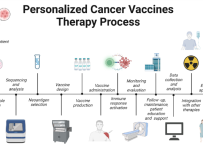Recent breakthroughs have significantly transformed traditional cancer treatment and management. Here’s an overview of some of the most noteworthy advancements:
Advanced Immunotherapy
Immunotherapy is revolutionizing cancer treatment by enhancing the body’s natural defense mechanisms to combat cancer. This approach has shown remarkable progress, particularly with immune checkpoint inhibitors, which work by releasing the brakes on the immune system to allow it to target and destroy cancer cells. This innovation has improved treatment options for various solid tumors and blood cancers, and ongoing research continues to reveal new insights into the timing and efficacy of these therapies. Recent studies indicate that combining immunotherapy with radiation for lung cancer can substantially improve patient survival rates while minimizing side effects.
Artificial Intelligence in Oncology
Artificial Intelligence (AI) is increasingly being used to replicate human cognitive functions in cancer care. Research from the Institute of Cancer Research in London highlights AI’s ability to detect patterns in breast cancer that are invisible to the human eye, offering new treatment possibilities for patients unresponsive to conventional therapies. AI also optimizes chemotherapy regimens by predicting drug tolerance and guiding clinical decisions, thus refining cancer treatment strategies and reducing unnecessary procedures.
CAR T-Cell Therapy
CAR T-cell therapy represents a significant advancement in cancer treatment by modifying T-cells, which are essential immune cells that fight infections, to better target cancer. This innovative approach has achieved notable success in treating leukemia. The process involves extracting T-cells from a patient’s blood, genetically modifying them to enhance their cancer-fighting abilities, and then reintroducing them into the patient’s body.
Robotic-Assisted Surgery
Robotic-assisted surgery utilizes advanced tools and cameras to perform minimally invasive procedures with greater precision. Surgeons operate robotic arms from a computer console, enhancing accuracy and reducing physical strain. This method is beneficial in various cancer treatments, including those for lung cancer, melanoma, prostate cancer, and ovarian cancer. The advantages of robotic surgery include reduced blood loss, minimized postoperative discomfort, and shorter hospital stays.
Liquid Biopsy
Liquid biopsy is a pioneering technique that involves analyzing non-solid biological samples, such as blood, to detect cancer early and assess treatment efficacy. By examining circulating tumor cells (CTCs) and other biomarkers, liquid biopsies provide valuable insights into tumor dynamics and therapy response. This method allows for ongoing monitoring and early detection of cancer recurrence.
Precision Medicine
Precision medicine focuses on tailoring treatment based on individual genetic profiles. By analyzing specific gene mutations and alterations, this approach helps in creating customized treatment plans and improving diagnosis accuracy. Precision medicine also aids in preventive measures for those at higher risk of cancer, offering guidance on lifestyle changes, early screenings, and other preventive strategies.
For cutting-edge cancer treatments and advanced technological therapies, consider consulting leading oncologists and state-of-the-art clinical facilities.


